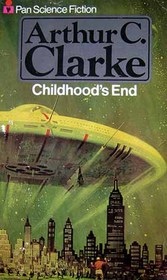Helpful Score: 4
Childhood's End begins much like a lot of alien invasion movies including V and Independence Day, but it has a completely different feel and tone. If the alien invaders are here to destroy us, they are surely taking their time doing it. Why are they here? The novel spans about 150 years. There is little continuity between the characters because the story is that of humanity not of individuals. In some of Clarke's other works like the 2001 series and Against the Fall of Night he explores the future of human evolution and questions whether the stars are for us or not. He asks those same questions in this book although with a bleaker, more final, and somewhat more abstract resolution. This is not my favorite Arthur C. Clarke novel, but it is still an excellent book. I recommend this for anyone who enjoys classic SF and wants to read about alien encounters and humanity's future. This is for anyone who enjoys a little bit of mysticism with their hard science fiction, for anyone who appreciates and respects mystery and awe in the midst of science and logic.
Helpful Score: 2
I requested the book without knowledge of his other works. While slow, the book pulled me in. It had a great story line, begging me to find out why the Overlords were there. Unfortunately, I believe the story would have been better if the beginnning had connected with the ending. The only constant were the Overlords. Stormgren and Van Ryberg may have been alive when the Overlords arrived, but what part did they really play in the completion of the story? They showed the reaction of humans to the unknown? This could have been done without Stormgren's capture or the details showing who followed the Overlords and those who did not. I was enticed to read the book because of the beginning yet I finished the book without those characters playing any future role. We jump forward in time to random people. There is no connection between Stormgren and Van Ryberg to the Greggson's or Jan. Wouldn't it have made more since to at least stick to the same family if you are going to move from the beginning of the Overlords' rule to when they show themselves and the story takes it's turn towards completion?
Helpful Score: 2
This haunting book is Clarke at the very top of his game. Savor it slowly.
Helpful Score: 2
Arthur C. Clarke is IMHO one of the best sci-fi writers of all time. Childhood's End is not one of his more well known novels and yet I think it is one of the more interesting because of the ideas it tries to convey. Clarke never misses an opportunity to expand our imagination and hint that there might be something greater than humanity out there.
Helpful Score: 2
Upon his death - I sought out the most recommended books of Mr. Clarke. This one was repeatedly listed as a favorite by some authors.
I did not like it, however. In the forward, Clarke practically says he made a mistake in writing it - because for a brief time a stage magician named Uri Gellar had convinced him that physic phenomenon was possible. Since that time, Clarke learned how Gellar did his tricks, and Gellar stopped calling himself a psychic. The book was embraced by C.S. Lewis because it makes a case for science being of limited scope, and the use of science being dangerous to our spiritual evolution. I may have enjoyed the book more if such thinking wasn't responsible for so many problems in the US - resulting in our culture's general disdain for science and preference for the supernatural.
In short - Clarke, as a science-based writer, was right to apologize. Its an irresponsible premise, and runs counter to understanding the human condition. I'm a bit bewildered at its being recommended by some respectable writers - I can only assume its because they were also fascinated with, and taken in by, spoon benders and other such characters, in their youth.
Also - there is plenty of his customary 'star child' theme - the man was apparently driven to distraction by the idea of humanity turning into magical star creatures. This makes for a good story once or twice - then becomes overly familiar to the reader.
two stars from me (of 5)
I did not like it, however. In the forward, Clarke practically says he made a mistake in writing it - because for a brief time a stage magician named Uri Gellar had convinced him that physic phenomenon was possible. Since that time, Clarke learned how Gellar did his tricks, and Gellar stopped calling himself a psychic. The book was embraced by C.S. Lewis because it makes a case for science being of limited scope, and the use of science being dangerous to our spiritual evolution. I may have enjoyed the book more if such thinking wasn't responsible for so many problems in the US - resulting in our culture's general disdain for science and preference for the supernatural.
In short - Clarke, as a science-based writer, was right to apologize. Its an irresponsible premise, and runs counter to understanding the human condition. I'm a bit bewildered at its being recommended by some respectable writers - I can only assume its because they were also fascinated with, and taken in by, spoon benders and other such characters, in their youth.
Also - there is plenty of his customary 'star child' theme - the man was apparently driven to distraction by the idea of humanity turning into magical star creatures. This makes for a good story once or twice - then becomes overly familiar to the reader.
two stars from me (of 5)




